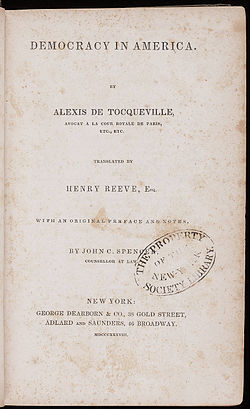
Back الديمقراطية في أمريكا (كتاب) Arabic Демокрацията в Америка Bulgarian De la démocratie en Amérique Breton La democràcia a Amèrica Catalan Über die Demokratie in Amerika German Η Δημοκρατία στην Αμερική Greek De la démocratie en Amérique Esperanto La democracia en América Spanish Amerikako demokrazia Basque دموکراسی در آمریکا Persian
 Title page of Democracy in America by Alexis de Tocqueville, printed at New York City, 1838 | |
| Author | Alexis de Tocqueville |
|---|---|
| Original title | De la démocratie en Amérique |
| Language | French |
| Publisher | Saunders and Otley (London) |
Publication date | 1835–1840 |
| Publication place | America |
Original text | De la démocratie en Amérique at French Wikisource |
| Translation | Democracy in America at Wikisource |
| Part of the Politics series |
| Republicanism |
|---|
|
|
De la démocratie en Amérique (French pronunciation: [dəla demɔkʁasi ɑ̃n‿ameˈʁik]; published in two volumes, the first in 1835[1] and the second in 1840)[2] is a classic French work by Alexis de Tocqueville. In the book, Tocqueville examines the democratic revolution that he believed had been occurring over the previous several hundred years.
In 1831, Tocqueville and Gustave de Beaumont were sent by the French government to study the American prison system. In his later letters, Tocqueville indicates that he and Beaumont used their official business as a pretext to study American society instead.[3] They arrived in New York City in May of that year and spent nine months traveling the United States, studying the prisons and collecting information on American society, including its religious, political, and economic character. The two also briefly visited Canada, spending a few days in the summer of 1831 in what was then Lower Canada (modern-day Quebec) and Upper Canada (modern-day Ontario).
Tocqueville and Beaumont returned to France in February 1832 and submitted their report, Du système pénitentiaire aux États-Unis et de son application en France (On the Penitentiary System in the United States and its Application in France), the next year. Tocqueville eventually extrapolated this work into the book Democracy in America, which was first published in Paris in two volumes. In the work, Tocqueville holds a critical lens to early 19th Century socioeconomic affairs in the United States. He notes the influence of American government and religious history on its entrepreneurial and relatively egalitarian culture. However, Tocqueville criticizes the moral, spiritual, artistic, and interpersonal costs of a society where social mobility and restlessness are organizing expectations. [4][5] Ultimately, since its publication, the work has had a dramatic impact on American (as well as broader Western) thought and education; especially in history, political science, and the social sciences.
- ^ de Tocqueville, Alexis (1835). De la démocratie en Amérique. Vol. I (1st ed.). Paris: Librairie de Charles Gosselin. Retrieved 24 June 2015. via Gallica; de Tocqueville, Alexis (1835). De la démocratie en Amérique. Vol. II (1st ed.). Paris: Librairie de Charles Gosselin. Retrieved 24 June 2015. via Gallica
- ^ de Tocqueville, Alexis (1840). De la démocratie en Amérique. Vol. III (1st ed.). Paris: Librairie de Charles Gosselin. Retrieved 24 June 2015. via Gallica; de Tocqueville, Alexis (1840). De la démocratie en Amérique. Vol. IV (1st ed.). Paris: Librairie de Charles Gosselin. Retrieved 24 June 2015. via Gallica
- ^ Johri, Vikram. "'Alexis de Tocqueville': the first French critic of the US". The Christian Science Monitor. Retrieved 22 April 2011.
- ^ de Tocqueville, Alexis (1835). De la démocratie en Amérique. Vol. I (1st ed.). Paris: Librairie de Charles Gosselin. Retrieved 24 June 2015. via Gallica; de Tocqueville, Alexis (1835). De la démocratie en Amérique. Vol. II (1st ed.). Paris: Librairie de Charles Gosselin. Retrieved 24 June 2015. via Gallica
- ^ de Tocqueville, Alexis (1840). De la démocratie en Amérique. Vol. III (1st ed.). Paris: Librairie de Charles Gosselin. Retrieved 24 June 2015. via Gallica; de Tocqueville, Alexis (1840). De la démocratie en Amérique. Vol. IV (1st ed.). Paris: Librairie de Charles Gosselin. Retrieved 24 June 2015. via Gallica
© MMXXIII Rich X Search. We shall prevail. All rights reserved. Rich X Search